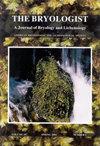巴西巴伊亚州Monte Pascoal的地衣,包括一些新的Pyrenoccarpus物种和巴西Pyrenula物种的一个关键物种
IF 1.5
4区 生物学
Q4 PLANT SCIENCES
引用次数: 4
摘要
摘要巴伊亚(巴西)的Monte Pascoal描述了以下七种新的Pyrenoccarpus地衣:柠檬状Astrothilum citrisporum Aptrout,Oliveira Junior&M.Cáceres,具有赭色的铊,紫外线阴性,半球状融合的子囊菌,同色假星状,未分散的金刚藻,和5×1–2正庚子,35–40×18–20µM的近脲形子囊孢子,柠檬状,两端尖;A.eustominspersum Aptrout&Oliveira Junior,具有浅灰色橄榄状的铊,紫外线阴性,融合了子囊,口孔紫外线+黄色,嵌有金丝藻,和3-庚状子囊孢子,25–27×7–7.5µm;A.flavogigasporum Apttroot,具橄榄状铊,紫外线阴性,子囊单体,顶端孔,黄金丝藻(K-阴性)内散,子囊孢子4/子囊,透明,密褐色,240–260×33–38µm,长椭球体,无增厚的中央隔膜;A.medicincassatum Aptrout&M.Cáceres,具有橄榄状的铊,紫外线阴性,子囊融合在不明显的群中,侧孔,金丝藻不分散,子囊孢子9-11有隔膜,98–115×23–27µM,长椭球体,中央隔膜增厚;凝胶状假核菌Apttroot,具有铊UV阴性,子囊膜单生,顶端孔,不散生的金刚子,和3间隔的子囊孢子,34–37×9–10.5µm,壁厚1µm,被9–10.5μm厚的凝胶鞘包围;Pyrenula salmonea Aptrout,具有鲑鱼粉红色的铊,子囊单生,顶端孔,密集透明的金丝藻,和子囊孢子3-间隔,单列,24-27×13-16µm,椭球体,管腔椭圆形到有点角,宽于长,在外部管腔和子囊壁之间没有内生孢子;和P.blogoneoastroidea Aptrout,具有橄榄状铊,紫外阴性,子囊融合,深深浸入树皮中,侧孔,金刚子不分散,子囊孢子3-间隔,24-27×10-12µm,长椭球体,管腔菱形,在外管腔和子囊孢子壁之间有厚的内孔层。另外还报告了353种,其中12种是巴西的首次记录,192种是巴伊亚州的首次记录。尽管巴伊亚是巴西地衣学研究最好的州之一。图中显示了经过一定时间的实地调查后收集的物种的累积数量。它并没有显著趋于平稳,这表明该地区出现了更多的物种。介绍了一个已知于巴西的Pyrenula物种的关键。本文章由计算机程序翻译,如有差异,请以英文原文为准。
Lichens from Monte Pascoal, Bahia, Brazil, with some new pyrenocarpous species and a key to the Pyrenula species from Brazil
Abstract. The following seven new species of pyrenocarpous lichens are described from Monte Pascoal in Bahia (Brazil): Astrothelium citrisporum Aptroot, Oliveira-Junior & M.Cáceres, with thallus ochraceous, UV-negative, ascomata fused in hemispherical, concolorous pseudostromata, hamathecium not inspersed, and ascospores submuriform, 5 × 1–2-septate, 35–40 × 18–20 µm, citriform, both ends pointed; A. eustominspersum Aptroot & Oliveira-Junior, with thallus pale greyish olivaceous, UV-negative, ascomata fused, ostiole UV+ yellow, hamathecium inspersed, and ascospores 3-septate, 25–27 × 7–7.5 µm; A. flavogigasporum Aptroot, with thallus olivaceous, UV-negative, ascomata single, ostioles apical, hamathecium yellowish (K-negative) inspersed, and ascospores 4/ascus, hyaline, densely muriform, 240–260 × 33–38 µm, long-ellipsoid, without thickened central septum; A. medioincrassatum Aptroot & M.Cáceres, with thallus olivaceous, UV-negative, ascomata fused in inconspicuous groups, ostioles lateral, hamathecium not inspersed, and ascospores 9–11-septate, 98–115 × 23–27 µm, long-ellipsoid, with thickened central septum; Pseudopyrenula gelatinosa Aptroot, with thallus UV-negative, ascomata solitary, ostioles apical, hamathecium not inspersed, and ascospores 3-septate, 34–37 × 9–10.5 µm, wall 1 µm thick, surrounded by a 9–10.5 µm thick gelatinous sheath; Pyrenula salmonea Aptroot, with thallus salmon pink, ascomata solitary, ostioles apical, hamathecium densely hyaline inspersed, and ascospores 3-septate, uniseriate, 24–27 × 13–16 µm, ellipsoid, lumina oval to somewhat angular, broader than long, without endospore between the outer lumina and the ascospore wall; and P. sanguineoastroidea Aptroot with thallus olivaceous, UV-negative, ascomata fused, deeply immersed in the bark, ostioles lateral, hamathecium not inspersed, and ascospores 3-septate, 24–27 × 10–12 µm, long-ellipsoid, lumina rhomboid, with thick endospore layer between the outer lumina and the ascospore wall. A further 353 species are reported, of which 12 are first records for Brazil and 192 are first records for the state of Bahia, despite it being one of the states of Brazil that is best investigated lichenologically. A graph is presented with the cumulative number of species collected after a certain time of fieldwork. It does not significantly level off, suggesting that many more species occur in the area. A key to the Pyrenula species known from Brazil is presented.
求助全文
通过发布文献求助,成功后即可免费获取论文全文。
去求助
来源期刊

Bryologist
生物-植物科学
CiteScore
2.40
自引率
11.10%
发文量
40
审稿时长
>12 weeks
期刊介绍:
The Bryologist is an international journal devoted to all aspects of bryology and lichenology, and we welcome reviews, research papers and short communications from all members of American Bryological and Lichenological Society (ABLS). We also publish lists of current literature, book reviews and news items about members and event. All back issues of the journal are maintained electronically. The first issue of The Bryologist was published in 1898, with the formation of the Society.
Author instructions are available from the journal website and the manuscript submission site, each of which is listed at the ABLS.org website.
All submissions to the journal are subject to at least two peer reviews, and both the reviews and the identities of reviewers are treated confidentially. Reviewers are asked to acknowledge possible conflicts of interest and to provide strictly objective assessments of the suitability and scholarly merit of the submissions under review.
 求助内容:
求助内容: 应助结果提醒方式:
应助结果提醒方式:


